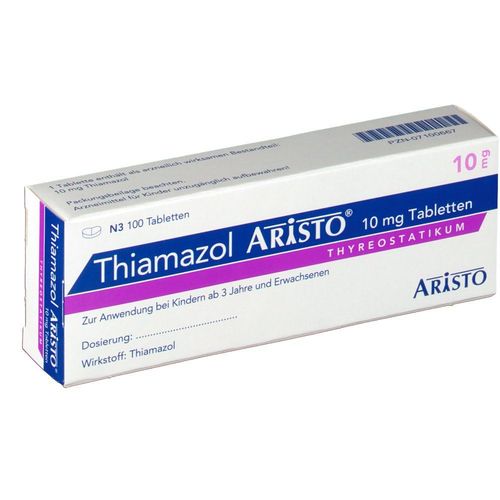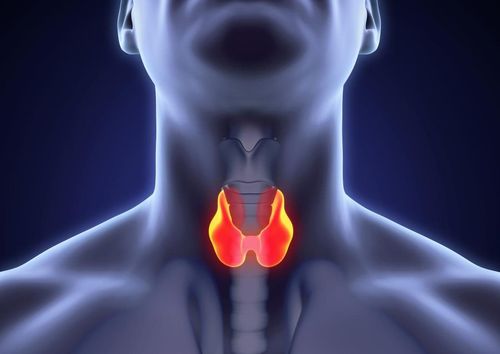This is an automatically translated article.
Disthyrox medicine containing the ingredient Levothyroxine is indicated for the treatment of alternative or complementary treatment of hypothyroidism in all ages, including pregnant women. However, the drug should not be used for transient hypothyroidism during the recovery period of subacute thyroiditis.
1. Mechanism of action of the drug Disthyrox
The ingredient Levothyroxine in Disthyrox is considered a thyroid hormone. When the drug enters the body, this compound will be absorbed in the ileum, jejunum and a small part in the duodenum. The extent of drug absorption can range from 48-79%, depending on a number of factors. However, if the body is in a fasted state, it can increase absorption more.The drug enters the body distributed over 99% of circulating hormones bound to plasma proteins, including thyroxine-binding globulin, pre-albumin and thyroxine-binding albumin. The binding affinity of the hormone to different binding components.
Metabolism and elimination of the drug Disthyrox has a conjugation between the Levothyroxine component with glucuronic and sulfuric acids in the liver and is excreted in the bile.
2. What is Dithyrox? Disthyrox is used in the alternative or complementary treatment of hypothyroidism syndromes of any cause at any age. The drug is also indicated for use in pregnant women. However, in cases of transient hypothyroidism during the recovery period of subacute thyroiditis, this drug should not be used. In addition, Disthyrox inhibits thyrotropin secretion (TSH), with this effect possibly beneficial in cases of simple goiter and chronic thyroiditis.
In addition, Disthyrox is also combined with antithyroid drugs in thyrotoxicosis, and also works to prevent goiter and hypothyroidism.
3. Dosage and how to use the drug Disthyrox
What is Dithyrox? Disthyrox drug containing Levothyroxine is indicated for cases of hypothyroidism, hyperthyroidism that has been returned to euthyroidism or after surgery for malignant tumors. The dose of Disthyrox to start and change can be different for each patient. In addition, the dose of Disthyrox depends on the side effects as well as the blood levels of thyroid hormone. It may take 1 to 3 weeks from the start of treatment to see the effectiveness of the treatment.
For adults, the dosage is about 12.5 to 125 mcg/day. There is no established dosage for children.
The dosage of Disthyrox above is for reference only. Therefore, if you use the drug to improve your health, you need to learn carefully and consult a doctor.
If you forget to take your medicine, use it as soon as you remember. However, if the missed dose of Disthyrox is close to your next dose, skip the missed dose and take the next dose. You should be careful not to double the dose of Disthyrox, because this can cause bad symptoms affecting health.
When drug overdose can cause symptoms of increased metabolism similar to endogenous thyrotoxicosis. Signs to recognize this symptom include weight loss, increased appetite, palpitations, diarrhea, restlessness, sweating, abdominal cramps, tachycardia, increased blood pressure and arrhythmias, insomnia, confusion. menstrual irregularities... These symptoms are not always obvious and may appear more immediately after using the drug.
Handling case of overdose of Disthyrox: If you experience unusual signs related to overdose, the patient should temporarily stop taking the drug and see a doctor. In case of acute overdose, symptomatic and supportive treatment should be performed immediately.
The aim of symptomatic treatment is to help reduce absorption from the gastrointestinal tract and to counteract effects on the central and peripheral nervous systems. Besides, it is possible to perform gastric lavage immediately or induce vomiting in the patient if there are no other contraindications. In some cases, it is possible to use Cholestyramine or activated charcoal to reduce the absorption of drug components in the body. Give the patient oxygen and maintain ventilation if needed. A beta-adrenergic blocker can be used to increase sympathetic activity, administered intravenously in doses of 1 to 3 mg over 10 minutes. For patients with heart disease, cardiac glycosides can be used if congestion occurs.
4. Undesirable side effects of the drug Disthyrox
Disthyrox medicine can cause unwanted side effects such as weight loss, tremors, headache, nausea, diarrhea, stomach cramps, nervousness, irritability, insomnia, increased appetite, changes in appetite. Change in menstrual cycle or sensitivity to heat, temporary hair loss,... If you experience any unusual symptoms while using the drug, you should stop using it and see a doctor to improve the treatment process.
A few cautions when using Disthyrox:
Disthyrox should be used with caution in patients with heart disease and hypertension. When these subjects develop pain in the condensate or worsening heart disease, it is necessary to reduce the dose; In patients with diabetes or renal impairment, treatment with Disthyrox may aggravate symptoms of the disease. Therefore, it is necessary to adjust the treatment appropriately in endocrine diseases; Disthyrox used in children overdose can cause premature healing of skull joints; Using Disthyrox in combination with anticoagulants requires regular testing of prothrombin time to determine whether dosage adjustment is needed; Although Dithyrox may have a small amount excreted in milk. But the drug has no harmful effects on young children and does not cause tumors. However, when used for women who are breastfeeding should still be cautious. Disthyrox drug interactions:
Combined use of Disthyrox with Amiodarone can cause hyperthyroidism or hypothyroidism; Anticoagulants, coumarins or drugs containing indandion derivatives may be affected when used together with Disthyrox. Furthermore, drug interactions depend on thyroid status. When the dose of thyroid hormone is increased, it may be necessary to reduce the anticoagulation dose; Antidiabetic drugs or insulin when combined with Disthyrox may increase the need for insulin in the body. Therefore, careful monitoring of diabetes control and a change or discontinuation of Disthyrox is required for thyroid treatment; Disthyrox and beta adrenergic blockers can be suppressed when hypothyroidism returns to normal; Tricyclic antidepressants used in combination with Disthyrox may increase the effects and increase toxicity of both drugs. Thus causing increased sensitivity to catecholamines; Concomitant use of Disthyrox with sympathomimetic agents may increase the risk of coronary insufficiency in patients with coronary artery disease; Somatrem combined with Disthyrox can rapidly ossify the bone head. Furthermore, untreated hypothyroidism affects growth response to both drugs. In summary, in addition to the therapeutic effect, the drug Disthyrox may cause some unwanted side effects such as headache, nausea, insomnia, excessive sweating, menstrual cycle changes... Before using the drug you should consult your doctor.
Please dial HOTLINE for more information or register for an appointment HERE. Download MyVinmec app to make appointments faster and to manage your bookings easily.













